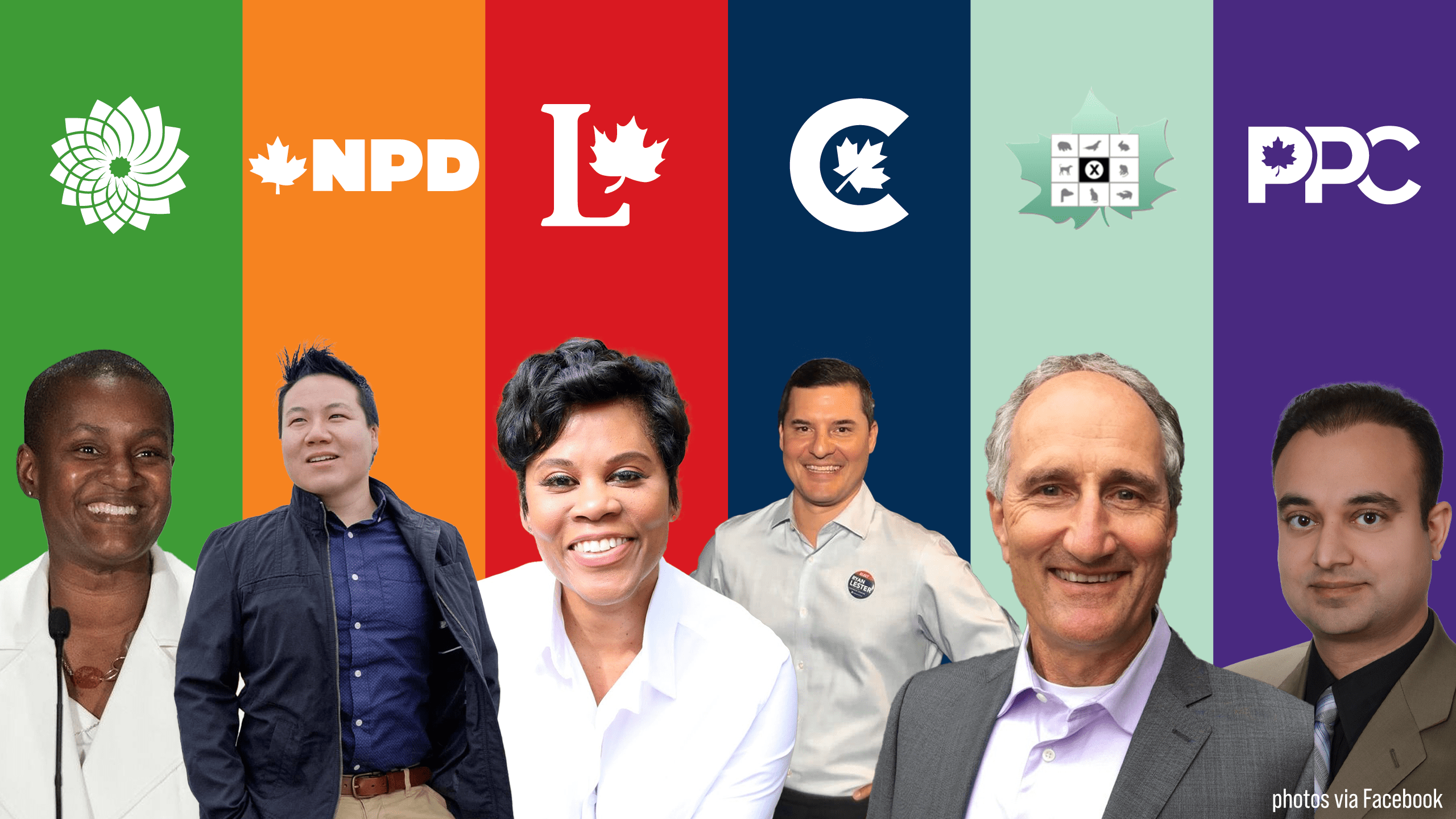By Krishika Jethani
Election season has come early for Canadian voters as Justin Trudeau has called for a snap election. Eligible Ryerson students have the opportunity to cast a ballot in the Toronto Centre riding—where Ryerson is located—which has seven candidates running in this year’s federal election.
On Sept. 1, the XU 2021 Toronto Centre candidates’ debate was held where candidates answered questions regarding social issues.
Here’s a breakdown of the electoral candidates running in the riding and what their platforms are promising to constituents:
Brian Chang – New Democratic Party (NDP)
In an email to The Eyeopener, New Democratic Party (NDP) candidate Brian Chang said he is “committed to working towards no tuition fees by making post-secondary education part of our public education system.”
According to Chang’s website, he is also looking to “[tackle] climate change by ending fossil fuel subsidies, implementing energy-saving building retrofits and a Green New Deal.”
Chang is an advocate for a “comprehensive” and “permanent” sick leave program and said he will fight to implement universal pharmacare and dental care programs.
In the email, Chang also said he hopes to start “building with 500,000 new units of affordable housing in the next 10 years, fast-start funds for purpose-built rentals and provide a rental benefit to families of up to $5,000 so they aren’t evicted when facing hard times.”
In a debate held by the voter engagement campaign XU Votes, Chang referred to Ryerson as “X” University and said the history of Egerton Ryerson is problematic. Chang “[looks] forward” to holding the administration accountable to promises made in the Standing Strong Task Force’s final report.
Marci Ien – Liberal Party of Canada
In XU Votes’ Toronto Centre candidates’ debate, Liberal Party candidate Marci Ien said she believes the strongest part of a community is its youth.
Ien, a graduate of Ryerson University’s media production program, has co-founded new scholarships at the RTA School of Media in order to further support students in media programs. Ien was also a former host of The Social on CTV.
She said these scholarships were “given to kids that came from communities who struggle to pay tuition,” in the debate.
By travelling internationally with Journalists for Human Rights and World Vision, she worked as a mentor for underprivileged youth, according to her website. World Vision Canada is a development and advocacy organization that works towards helping families and communities that have struggled because of poverty and injustice issues.
According to the Liberal Party’s website, they are looking to “finish the fight against COVID-19” by investing $9 billion over five years to support long-term care homes and $500 million in mental health resources on campus.
In the XU Votes debate, Ien said she agrees with the university’s decision to rename and that she will “continue to work hard with regards to [reconciliation].”
In an email to The Eye, a spokesperson for Marci Ien’s campaign said that she is determined to “create a new fund to help improve wait times and access mental health services for students.”
The Liberal Party is also looking to cut back on emissions by requiring all plastic packaging in Canada to contain 50 per cent recycled content by 2030 and advancing “new measures to achieve an ambitious 40 to 45 per cent reduction in emissions by 2030 compared to 2005 levels.”
Annamie Paul – Green Party of Canada
As the first Black and first Jewish woman to be the leader of a major Canadian party, Green Party leader Annamie Paul said she is determined to be a strong voice for the Toronto community.
In the XU Votes debate, Paul also referred to Ryerson University as “X” University and acknowledged the university’s efforts in taking the steps toward reconciliation guided by Indigenous leadership. According to her website, Paul will focus on issues surrounding affordable housing and access to mental health services.
Also on Paul’s website, her platform supports a guaranteed liveable income which would “provide every Canadian with a basic revenue source, ensuring that people can cover basic expenses such as food and accommodation.”
Her website also addresses “the opioid epidemic ravaging our community” and said she will call for decriminalization and a safe supply of drugs.
Paul said any candidate running for the Toronto Centre should be aware that voters in this riding are being asked to vote under “very difficult circumstances.”
“We just had an election 10 months ago in the second wave of the pandemic,” said Paul. “Students need real help now, the pandemic is not over.”
Ryan Lester – Conservative Party of Canada
Ryan Lester is the Conservative Party candidate for Toronto Centre and his website said he wants to ”bring together everyone who believes in a balance between fiscal responsibility, progressive social policy and individual rights and responsibilities.”
In the XU Votes’ Toronto Centre candidates’ debate, Lester said “the conservative plan will provide direct benefits to parents so they can make the best choice for their own families.”
Lester, a graduate of Ryerson’s public administration and governance program, said in his platform that he values LGBTQ2 equality. In the XU Votes’ Toronto Centre candidates’ debate, Lester said he was “very happy to see that the school is embarking on its next chapter to find a new name.”
“[Lester] knows that creating safer and more inclusive spaces for LGBTQ2+ people in Canada happens in our homes, workplaces and in our own communities through the conversations that we have every day,” his website reads.
He also advocates for truth and reconciliation and wants to “empower” Indigenous communities.
Lester has been a director for Pride Canada, Egale Canada and for the AIDS Committee of Toronto (ACT).
Syed Jaffery – People’s Party of Canada (PPC)
Syed Jaffery, the People’s Party candidate for Toronto Centre, began his political career as a student leader and gained experience by volunteering with party candidates during their run for office.
Jaffery’s website describes him as “passionate about our policies for a stronger economy and Indigenous rights.”
According to the People’s Party of Canada’s (PPC) website, they are looking to combat affordable housing in Toronto by “modify[ing] the Bank of Canada’s inflation target from 2 per cent to 0 per cent.”
They will also “stop funding social houses, which unfairly competes with private developers and has historically been a financial, social and urban planning disaster in every city where it’s become widespread.” Social houses are government-assisted housing that include lower-cost rental units.
The PPC’s platform is similar to the one put forward in 2019 and would phase out all pandemic spending programs, eliminate all funding for multiculturalism and abandon environmental initiatives. According to The Canadian Press, the PPC would withhold funding for post-secondary institutions that “violates the freedom of expression of its students or faculty.”
Ivan Byrad – Communist Party of Canada
Ivan Byrad, the Communist Party candidate in Toronto Centre, is the general secretary of the Young Communist League of Canada and has actively been fighting for workers’ rights, one being the “Fight for $15 and Fairness” campaign. Through this campaign, he advocated for raising the minimum wage and climate justice issues, among others.
According to Byrad’s website, he is ready to advocate for the “complete elimination of tuition and related fees for all levels of education, from early learning and childcare all the way to post-graduate studies.”
According to the Communist Party’s website, they are looking to “act to halt climate change” by substantially expanding urban transit, including eliminating fares and imposing heavy fines and jail time for corporate polluters.
The party would also look to “adopt an independent Canadian foreign policy of peace and disarmament, cut military spending by 75 per cent, oppose the upgrading of NORAD, and withdraw from NATO and NORAD” immediately.
The Communist Party would further advocate for universal pharmacare and “reduce drug overdose deaths with harm reduction and ‘safe supply’ policies.”
Peter Stubbins – Animal Protection Party of Canada
Peter Stubbins, the candidate for the Animal Protection Party in Toronto Centre, completed a physiotherapy degree at the University of Toronto in 1984 and worked in the field for 36 years. He also completed a five-year program in osteopathy while working in the physiotherapy field.
According to the Animal Protection Party’s platform, they support universal health care being expanded to “include dental care, eye care and drugs, and [a system] that treats and supports people in crisis with such issues as addiction and mental health.”
Stubbins’ website also said he has a clear understanding of how to save money in the healthcare system by instead using it for mental health issues, for the youth and for frail elderly care.
The Animal Protection Party also has various proposals regarding climate change, including immediately implementing an aggressive carbon pricing mechanism, imposing tariffs on goods from nations that do not have carbon pricing measures as aggressive as Canada’s; subsidies for the development of alternative energy and more.
“Taking care of the planet will take care of people,” Stubbins’ website reads.
Students can visit Elections Canada’s website for information regarding registering to vote as well as details about voting by mail or at advance polling stations. Election day is on Monday, Sept. 20.












Leave a Reply